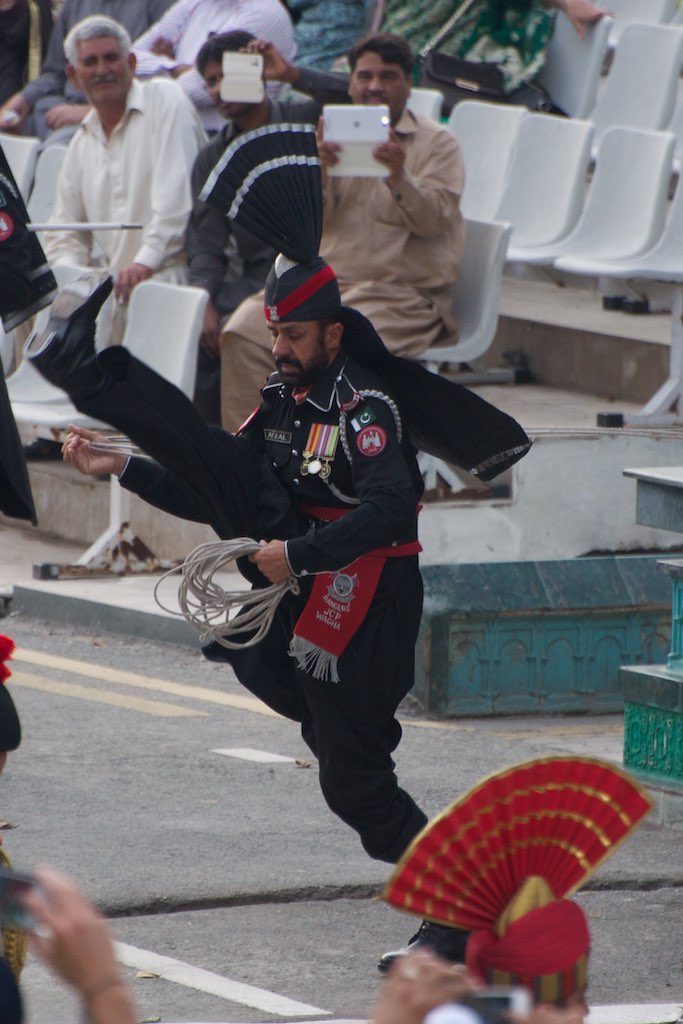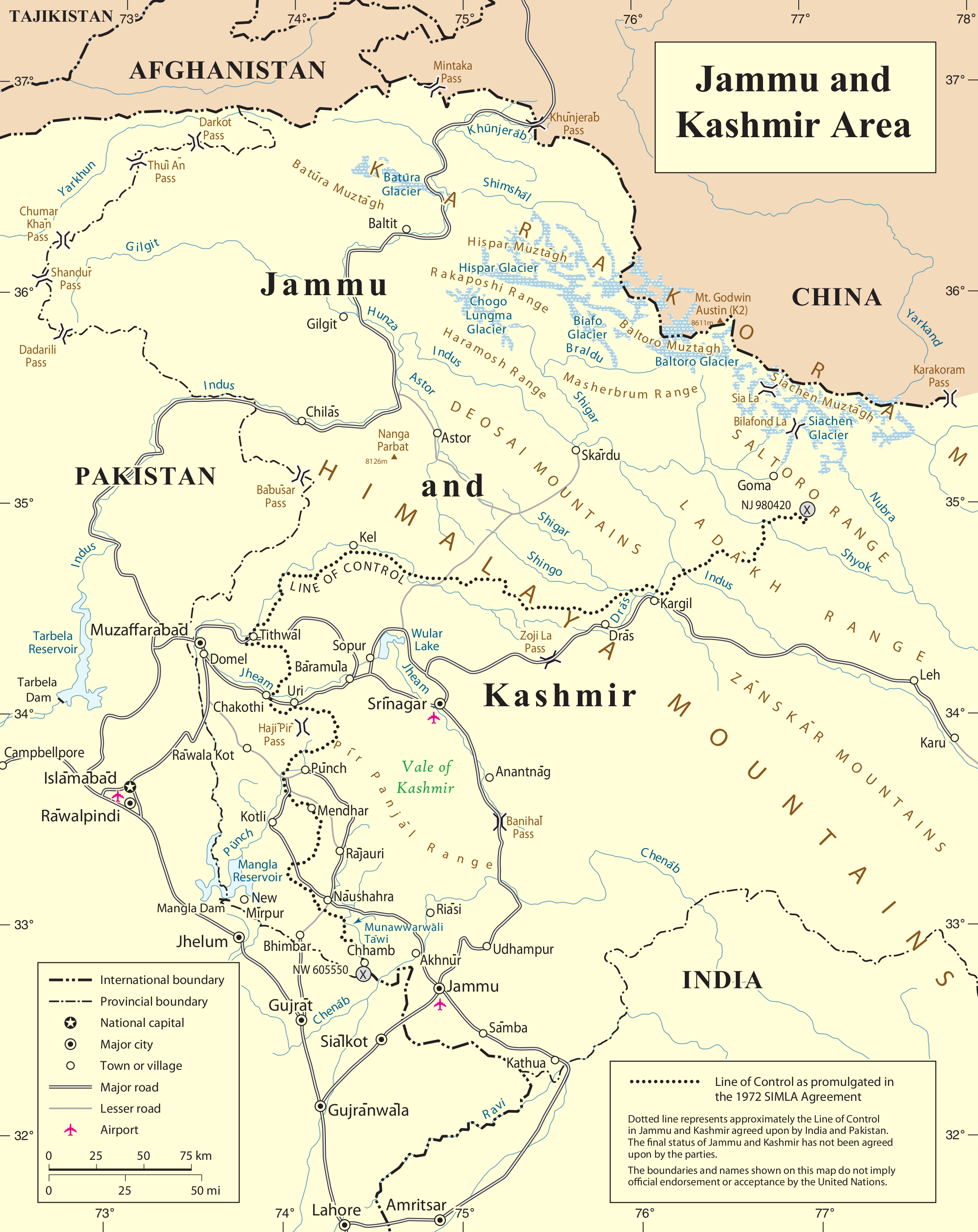|
Poonch–Rawalakot Bus
The Poonch-Rawalakot Bus is a India–Pakistan border, cross-border transport service that connects Poonch district, India, Poonch in Indian-administered Kashmir with Rawalakot in Azad Kashmir. The service was inaugurated on 21 June 2006, serving as an important confidence-building measure between India and Pakistan. History The bus service was launched after the success of the Srinagar–Muzaffarabad Bus, Muzaffarabad to Srinagar bus service which started on 7 April 2005. Initially launched as a fortnightly service, in August 2008, buses began to operate weekly. The Poonch-Rawalakot bus service was started on 6 June 2006. Suspension and resumption The bus service has experienced interruptions due to conflicts and tensions along the Line of Control, LoC. Despite these challenges, it has demonstrated its resilience by restarting operations following such events. Now it has been suspended from 2019. Impact The bus service has acted as a bridge, reconnecting countless Kashmiris sep ... [...More Info...] [...Related Items...] OR: [Wikipedia] [Google] [Baidu] |
Rawalakot
Rawalakot () is the capital of Poonch District, Pakistan, Poonch district in Pakistan–administered Azad Kashmir, in the disputed Kashmir region. It is located in the Pir Panjal Range. History 1947 Poonch rebellion On 15 June 1947, Sardar Ibrahim Khan addressed a meeting in Rawalakot attended by 20,000 people, and gave a speech telling his audience that Pakistan, a Muslim state, was coming into being and the people of Jammu and Kashmir could not remain unaffected. After that day, he says, "a strange atmosphere took the place of the usually peaceful life in these parts". On 22 June, Chaudhary Hamidullah, the acting president of the Muslim Conference, visited Rawalakot and initiated secret plans to organise the ex-servicemen of the district for an eventual confrontation with the Dogra State Forces. On or around 6 October, the armed rebellion started in the Poonch district. The fighting elements consisted of "bands of deserters from the State Army, serving soldiers of the Pak ... [...More Info...] [...Related Items...] OR: [Wikipedia] [Google] [Baidu] |
India–Pakistan Border
The India–Pakistan border is the international boundary that separates the nations of the Republic of India and the Islamic Republic of Pakistan. At its northern end is the Line of Control, which separates Indian-administered Jammu & Kashmir from Pakistani- administered Kashmir; and at its southern end is Sir Creek, a tidal estuary in the Rann of Kutch between the Indian state of Gujarat and the Pakistani province of Sindh. Arising from the partition of India in 1947, the border covers the provincial boundaries of Gujarat and Rajasthan with Sindh, and the Radcliffe Line between the partitions of Punjab. It traverses a variety of terrain in the northwestern region of the subcontinent, ranging from major urban areas to inhospitable deserts. Since the beginning of the India–Pakistan conflict shortly after the two countries' conjoined independence, it has been the site of numerous cross-border military standoffs and full-scale wars. The border's total length is accordin ... [...More Info...] [...Related Items...] OR: [Wikipedia] [Google] [Baidu] |
Indian-administered Kashmir
Kashmir ( or ) is the northernmost geographical region of the Indian subcontinent. Until the mid-19th century, the term ''Kashmir'' denoted only the Kashmir Valley between the Great Himalayas and the Pir Panjal Range. The term has since also come to encompass a larger area that includes the Indian-administered territories of Jammu and Kashmir and Ladakh, the Pakistani-administered territories of Azad Kashmir and Gilgit-Baltistan, and the Chinese-administered territories of Aksai Chin and the Trans-Karakoram Tract. Quote: "Kashmir, region of the northwestern Indian subcontinent. It is bounded by the Uygur Autonomous Region of Xinjiang to the northeast and the Tibet Autonomous Region to the east (both parts of China), by the Indian states of Himachal Pradesh and Punjab to the south, by Pakistan to the west, and by Afghanistan to the northwest. The northern and western portions are administered by Pakistan and comprise three areas: Azad Kashmir, Gilgit, and Baltistan, ... Th ... [...More Info...] [...Related Items...] OR: [Wikipedia] [Google] [Baidu] |
Azad Kashmir
Azad Jammu and Kashmir (), abbreviated as AJK and colloquially referred to as simply Azad Kashmir ( ), is a region administered by Pakistan as a nominally self-governing entitySee: * * * and constituting the western portion of the larger Kashmir region, which has been the subject of a dispute between India and Pakistan since 1947.The application of the term "administered" to the various regions of Kashmir and a mention of the Kashmir dispute is supported by the tertiary sources (a) through (e), reflecting due weight in the coverage. Although "controlled" and "held" are also applied neutrally to the names of the disputants or to the regions administered by them, as evidenced in sources (h) through (i) below, "held" is also considered politicized usage, as is the term "occupied" (see (j) below). On its eastern side, Azad Kashmir is separated from the Indian–administered territory of Jammu and Kashmir by the Line of Control (LoC), which serves as the '' de facto'' bo ... [...More Info...] [...Related Items...] OR: [Wikipedia] [Google] [Baidu] |
Srinagar–Muzaffarabad Bus
The Srinagar–Muzaffarabad Bus (, ) is a passenger bus service connecting Srinagar, the summer capital of the Indian-administered union territory of Jammu and Kashmir with Muzaffarabad, the capital of the Pakistani-administered territory of Azad Jammu and Kashmir across the Line of Control (LoC)—the boundary line denoting rival areas of control in the disputed region of Kashmir, but which is not an official international border. The bus is of symbolic importance to the efforts of the two nations' governments to foster peaceful and friendly relations and follows the success of the Delhi–Lahore Bus launched in 1999. Background Since the First Kashmir War (1947–48), travel and communication between what became Pakistan administered Kashmir and Indian-administered Kashmir were indefinitely suspended. The region was a major theatre of war during the Indo-Pakistani Wars of 1965 and 1971. In the 1990s, the Line of Control was the scene of exchanges of fire between Pakistan ... [...More Info...] [...Related Items...] OR: [Wikipedia] [Google] [Baidu] |
Line Of Control
The Line of Control (LoC) is a military control line between the Indian and Pakistanicontrolled parts of the former princely state of Jammu and Kashmir—a line which does not constitute a legally recognized international boundary, but serves as the '' de facto'' border. It was established as part of the Simla Agreement at the end of the Indo-Pakistani War of 1971. Both nations agreed to rename the ceasefire line as the "Line of Control" and pledged to respect it without prejudice to their respective positions. Apart from minor details, the line is roughly the same as the original 1949 cease-fire line. The part of the former princely state under Indian control is divided into the union territories of Jammu and Kashmir and Ladakh. The Pakistani-controlled section is divided into Azad Kashmir and Gilgit–Baltistan. The northernmost point of the Line of Control is known as NJ9842, beyond which lies the Siachen Glacier, which became a bone of contention in 1984. To the ... [...More Info...] [...Related Items...] OR: [Wikipedia] [Google] [Baidu] |
Delhi–Lahore Bus
The Delhi–Lahore Bus, officially known as Sada-e-Sarhad (Translation: ''Call of the Frontier, ; )'', is a passenger bus service connecting the Indian capital of New Delhi, Delhi with the city of Lahore, Pakistan via the border transit post at Wagah near Attari. The Routemaster bus number 10 was of symbolic importance to the efforts of the governments of both nations to foster peaceful and friendly relations. In its inaugural run on 19 February 1999, the bus carried the then-Indian Prime Minister Atal Bihari Vajpayee, who was to attend a summit in Lahore and was received by his Pakistani counterpart, Nawaz Sharif at Wagah. In August 2019 Pakistan decided to stop the service in the wake of India revoking Jammu and Kashmir's special status. Officially launching its services on 16 March, the bus service was not halted even after the outbreak of the Kargil War. The bus service was halted in the aftermath of the 2001 Indian Parliament attack, which led to a serious confrontati ... [...More Info...] [...Related Items...] OR: [Wikipedia] [Google] [Baidu] |
Transport In Jammu And Kashmir
Transport (in British English) or transportation (in American English) is the intentional movement of humans, animals, and goods from one location to another. Modes of transport include air, land (rail and road), water, cable, pipelines, and space. The field can be divided into infrastructure, vehicles, and operations. Transport enables human trade, which is essential for the development of civilizations. Transport infrastructure consists of both fixed installations, including roads, railways, airways, waterways, canals, and pipelines, and terminals such as airports, railway stations, bus stations, warehouses, trucking terminals, refueling depots (including fuel docks and fuel stations), and seaports. Terminals may be used both for the interchange of passengers and cargo and for maintenance. Means of transport are any of the different kinds of transport facilities used to carry people or cargo. They may include vehicles, riding animals, and pack animals. Vehicles may includ ... [...More Info...] [...Related Items...] OR: [Wikipedia] [Google] [Baidu] |



